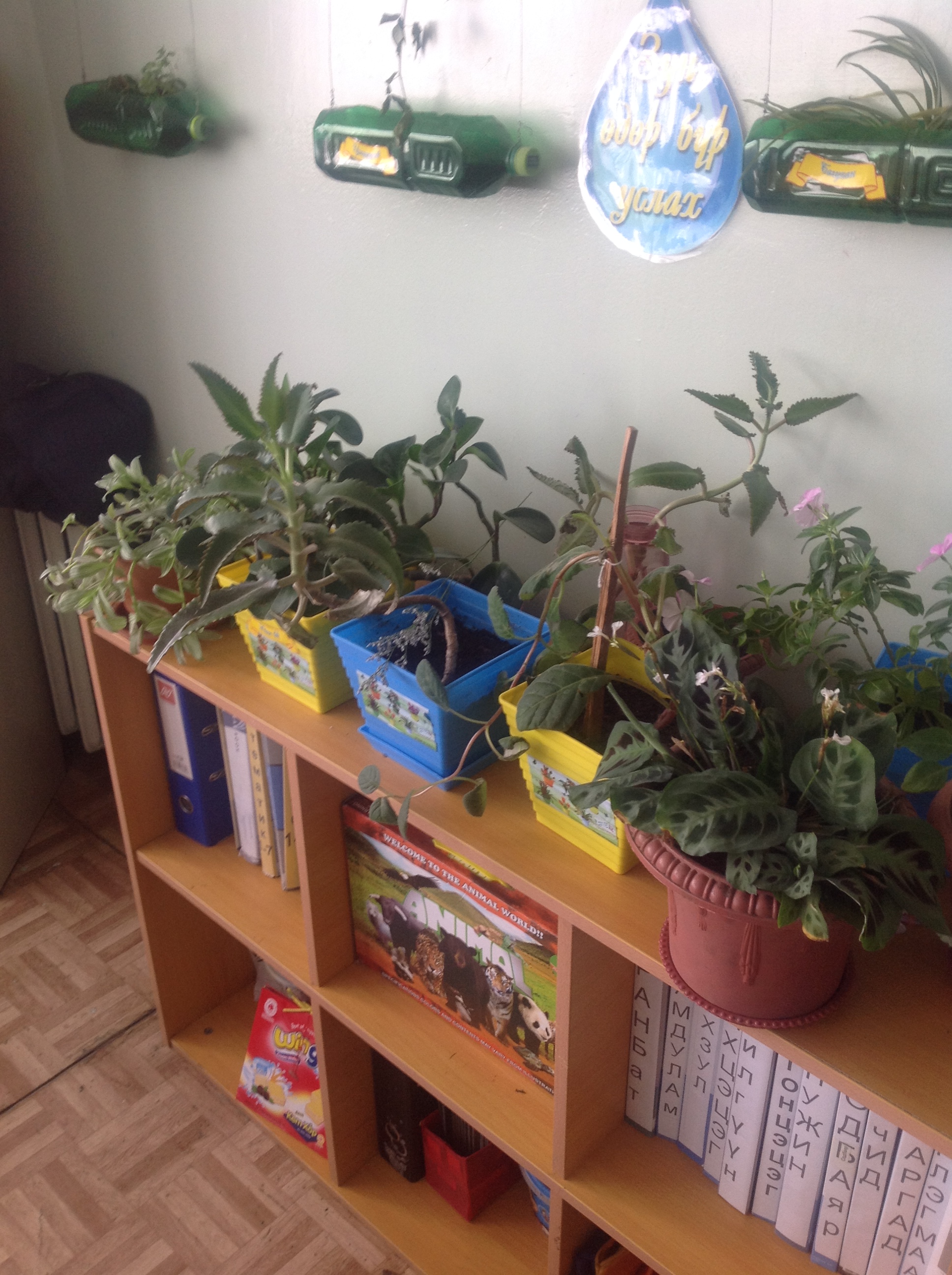Darren Rabinowitz (dr3011@tc.columbia.edu)
Woo-Jung Kim (wak2118@tc.columbia.edu)
Madalina Ciocanu (mc4561@tc.columbia.edu)
Kairat Kurakbayev (kk3282@tc.columbia.edu)
The United Nations calls Climate Change the ‘defining issue of our time’. Issues of sustainability will become increasingly pertinent to our collective struggles as changes to the Earth’s climate continue to cause devastation and heavily affecting already vulnerable populations. Thus, it is vital we expand our understanding of sustainability to include the multitude of ways pivot issues of inequity to converge with environmental issues in global and local systems.
As emerging professionals in the fields of education, health, and psychology, we must develop a literacy of sustainability to understand how these issues may connect to our future professional goals and lives. To do so, we must integrate sustainability across all disciplines investigating the ways environmental issues collide with economic, political and cultural understandings. We see the integration of sustainability not as “add-on” to courses, but as curricular possibilities that strengthen the socio-political frameworks many courses already explore. A commitment to teaching sustainability is not merely a commitment to environmental issues, but to the struggles for a socially just society more generally.
In this project, we sought to examine how TC students view the opportunities to learn about and engage with sustainability issues. Results are based on an online survey conducted on October 29th - November 19th, 2018 among a sample of 480 students at Teachers College, Columbia University. This school wide survey was part of a larger sustainability research project as part of Dr. Oren Pizmony-Levy’s ITSF 5031: Environmental and Sustainability Education course. Throughout the survey’s duration, 12 students who were part of this course, promoted the survey to other TC students and faculty through recycled cardboard advertisements and personally asked TC students and faculty to take the survey.
Most of the survey items were developed by the aforementioned ITSF 5031 students, two support staff, and Dr. Oren Pizmony-Levy. The survey questions revolved around respondent’s demographics, students’ understanding of sustainability and environment, how well TC’s departments/programs teach and discuss sustainability, possible effects climate change has on TC compared to where respondents reside, and possible sustainability initiatives that could be implemented at TC.
Sources for learning about environmental issues
The environment is widely covered in the media, on the Internet, and is a topic of everyday discussion to which the public have wide access. We therefore asked TC students about the information sources from which they “mainly learned” about environmental issues. Students were given seven sources and they could tick as many as they wished: Courses at TC, professional associations, media (TV, radio, newspapers, magazines), friends, family, Internet or social media, and books.
Our findings paint a rather grim picture pertaining to the degree in which students perceive TC courses as sources of information about environmental issues. Only 7% of TC students claim to learn about environmental problems from their classes (Figure 1). In contrast, a vast majority of students (87%) report that they get most of the information about environmental problems from TV, newspapers, radio and magazines. These patterns remain consistent across domestic and international students, doctoral and masters students, and the three primary professional fields offered at TC.
Figure 1: Main sources for TC students to learn about environmental issues
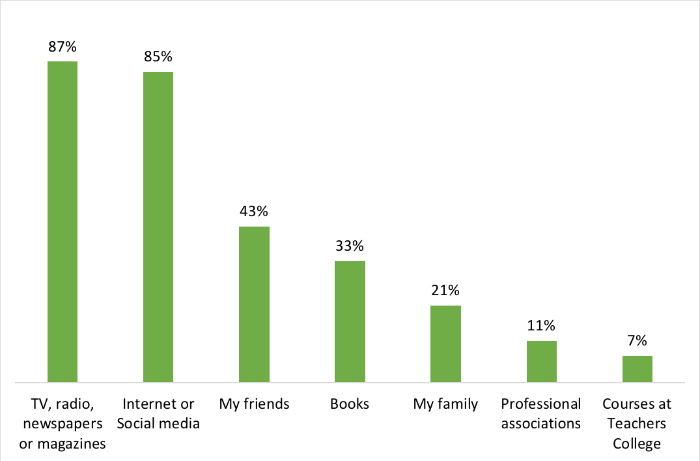
Source: How Green is TC Survey, 2018
Importantly, we find much variation between departments (Figure 2). One-quarter of students (26%) in Health and Behavioral Science (HBS) and 15% of students in International and Transcultural Studies (ITS) say they learn about environmental problems in their course work. In contrast, not a single student from Education Policy and Social Analysis (EPSA) and Bio Behavioral Sciences (BBS) report they learn about environmental problems in their course work.
Figure 2: Percentage of students who mention courses at TC as a source to learn about environmental issues, by department
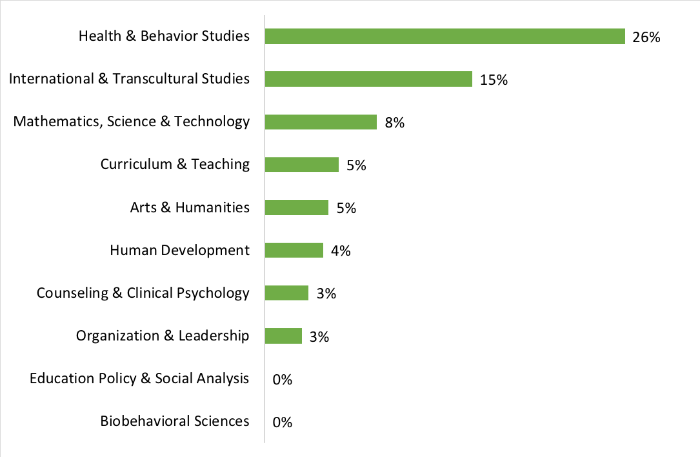
Source: How Green is TC Survey, 2018
Opportunity to learn about environmental and sustainability issues
We further examined TC’s curriculum by asking students to comment on the opportunity to learn about environmental and sustainability issues in classes. Overall, students report on little exposure to these issues (Figure 3):
- Slightly more than one-quarter (28%) say that professors mention environmental issues, climate change/global warming sometimes or always.
- About one-fifth (21%) say that professors discuss environmental issues related to sustainable development or the UN Sustainability Development Goals.
- About one-in-six students (17%) say that professors assign readings that mention environmental issues.
- About one-in-seven students (14%) say that professors discuss ways for students to protect and preserve the environment.
Figure 3: Opportunity to learn environmental and sustainability education at TC
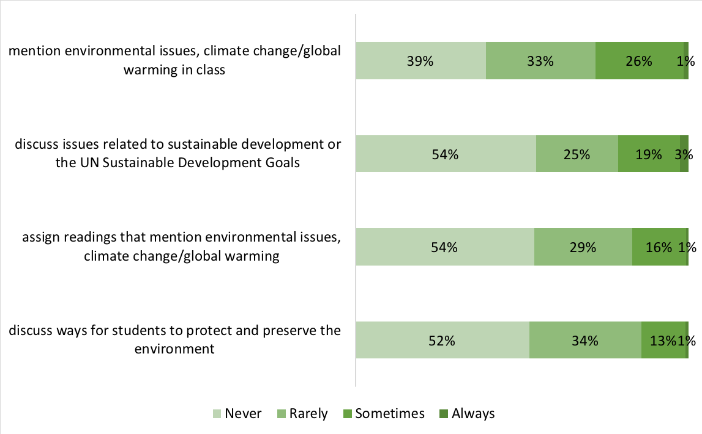
Source: How Green is TC Survey, 2018
Based on these four indicators we calculated a scale. Higher values on this scale mean more opportunity to learn about environmental and sustainability issues in classes. The mean across all departments at the College is relatively low (between rarely [2] and sometime [3]). Once again, we observe variation between departments (Figure 4). The value of the opportunity to learn scale is higher in International and Transcultural Studies (ITS; M=2.2) and Health and Behavioral Science (HBS; M=2.1) than in other departments, whereas the value of the scale is lower in Bio Behavioral Sciences (BBS; M=1.3) and Education Policy and Social Analysis (EPSA; M=1.3).
Figure 4: Opportunity to learn environmental and sustainability education at TC, by department
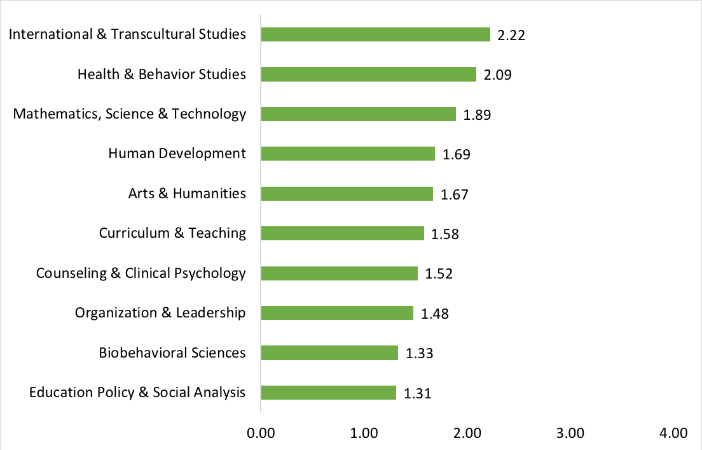
Source: How Green is TC Survey, 2018
Inclusion of sustainability statement in syllabi
Sustainable practices are relevant to all aspects on campus, including the ways that professors design courses and set requirements (e.g., requiring students to submit assignments online versus in hard copy). Course syllabi can set in motion these practices through a short Sustainability Statement (see example below). About one-fifth (19%) of students say they saw at least one syllabus with a Sustainability Statement. The following comments reflect students’ stance to include sustainability practices in TC classrooms:
“I already appreciate that most assignments are submitted electronically” (female student, Organization & Leadership)
“I would like professors to consider allowing students to use laptops in class. Most of my professors require me to print out my readings, but I think it's a poor practice in regards to the environment. Additionally, I cannot afford to add more money to my printing purse. I do not know how it translates to an activity, but it could be a change in course policy” (female student, Arts & Humanities)
Example: Sustainability Statement
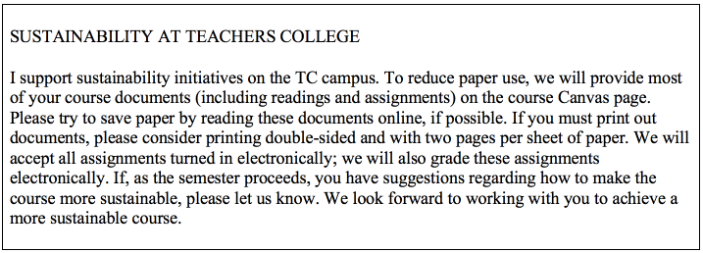
Source: ITSF 4101 Introduction to Quantitative Data Analysis
In another survey, we asked TC faculty if they are willing to include a Sustainability Statement in their future syllabi. An overwhelming majority of professors (71%) report they would be ‘very willing’ or ‘fairly willing’ to add this statement to their syllabi.
Conclusion
Overall, our analysis of data from the How Green Is TC survey suggests that students have little opportunity to learn about environmental and sustainability issues. There are different ways to address this gap. We advocate for more lectures and workshops that pertain to sustainability and the academic disciplines/fields of study represented at TC. Students across the College have expressed the necessity and desire for TC to stimulate discussion about environmental and sustainability issues:
“I think it is important to educate people in the TC community on environmental sustainability issues...maybe at least a unit during orientation or more ways of integrating it into the culture and classes that already exist” (female student, Education Policy & Social Analysis)
“I definitely feel ignorant about our environment. I like the idea of gaining more knowledge on the subject, but maybe through a talk during orientation or a talk that is extra credit. While I would love to take a zero credit course to learn more, it would definitely stress me out given all the stress of graduate school already. I do feel I learned a lot just from this survey though, so thank you!” (female student, Curriculum & Teaching)
“Providing more opportunities for students to learn about environmental issues through voluntary means, such as free online instructional media, and other venues would be a good idea” (male student, Mathematics, Science & Technology)
Another approach is to develop an academic task force for sustainability integration in curricula where ideas and a yearly action plan can be developed. Integrating environmental and sustainability education naturally pushes for a consideration of pedagogies and methods of transmitting the academic material, giving space to reconsider TC’s standing, positionalities, and allow for the exploration of post-anthropocentric epistemologies. This move is imperative for innovating teaching and thought at TC.
I think there would need to be a variety of options for this "course," some tied to areas of study, some maybe tied to TC/campus life. My area of study is TESOL, which ostensibly has nothing to do with sustainability. But I can already think of a number of ways sustainability can be tied in. There could be a course about pollution in NYC and its effects on school children (I'm thinking of "asthma alley" in the south Bronx, which has a huge # of school kids with asthma, and a high # of ENL kids). How to include environmental science in lessons across disciplines. Field trips, class activities. Lots of stuff. Could be really cool! (female student, Arts & Humanities)
